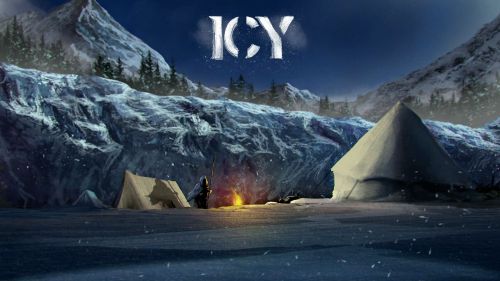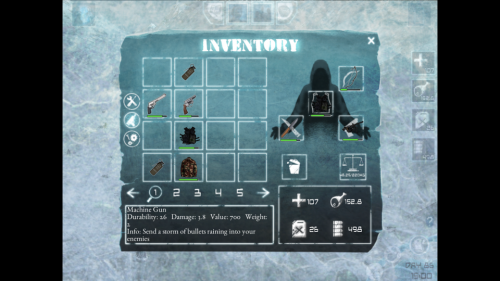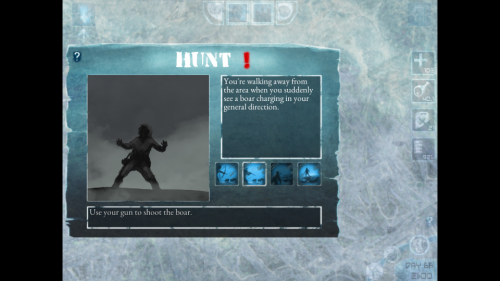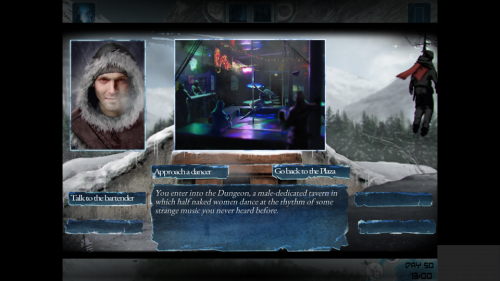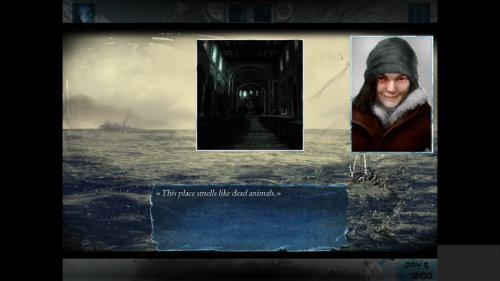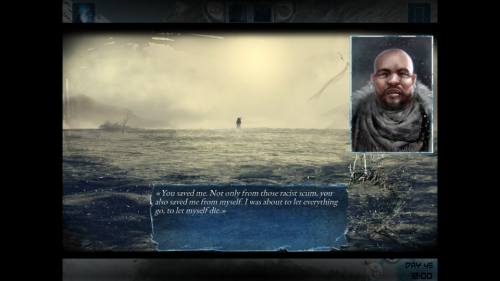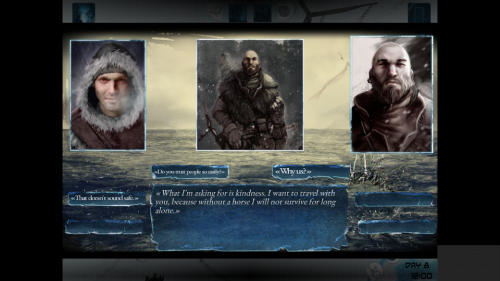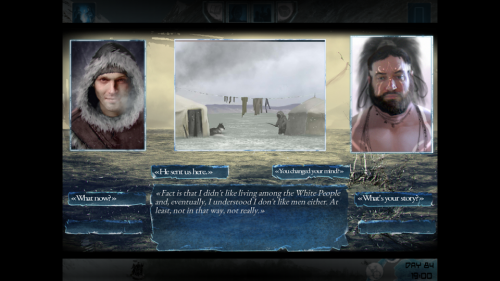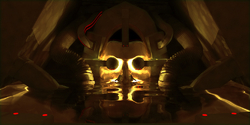RPG Codex Review: ICY
RPG Codex Review: ICY
Review - posted by Crooked Bee on Mon 30 November 2015, 22:15:23
Tags: Icy; Innervoid InteractivePost-apocalyptic games seem to be the vogue again as of late, what with everybody on the Codex playing Fallout 4, not to mention (the admittedly less fashionable) Wasteland 2, NEOScavenger, or the all too numerous survival sims. In the midst of this deluge, I bet a lot of you missed out on the indie Italian post-apocalyptic RPG with gamebook elements by the name of ICY -- set, as its name suggests, in a future ice age, which by itself makes for a rather fresh setting.
We are lucky, then, to have esteemed community member Deuce Traveler remind us about and review it.
Read the full review: RPG Codex Review: ICY
We are lucky, then, to have esteemed community member Deuce Traveler remind us about and review it.
After a quick tutorial that plays in the style of a choose-your-own-adventure gamebook, you are flung out onto the overhead map of ICY's frozen open world. In-game time progresses as you move around, explore and hunt. These activities use up critical party resources - as time progresses you consume rations, camping requires gas to start the campfire, firing weapons uses up ammunition, and healing your party members requires first aid kits. Without these resources, your party will suffer the detrimental effects you'd expect - with no campfire, your party will suffer from exposure when resting, while running out of food will lead to death by starvation.
Since these resources are critical to your survival, you'll find yourself constantly investigating the various abandoned structures and strange occurrences that you'll come across during your journey, in hopes of finding an extra gallon of gas, or valuable treasure that you can trade. Of course, exploration comes with risks - rickety structures have the potential to collapse, or might be inhabited by monsters. It may also use up items such as ropes, grappling hooks, crowbars, lockpicks, and so on - tools that you'll also want to collect to aid in your scrounging. Because you eat up these resources so quickly, it behooves you to try and map out potential locations to explore along the way to your final destination.
ICY's combat is also reminiscent of gamebook-style conflict resolution. The more party members you have, the greater your overall combat strength. Your party attacks turn-by-turn, hit points and morale fluctuating until all your opponents are dead or have fled. A "Balance" meter in the center of the screen shifts in or out of your party's favor depending on how successful the previous rounds have been for you, offering combat bonuses to the side with the advantage. I recommend investing some points into your Firearms or Bow skill, as enemy combat rounds are often interrupted by the option to take a pot shot at the enemy before he strikes a horrible blow against one of your companions. Once you've won, it's time to do some looting and use your medical kits to patch up injured companions. Each use of a medical kit recovers a number of hit points based on your character's skill level. Your main character's skills are crucial here, since non-player characters cannot use medical kits themselves, nor scrounge or employ any other special skillset. Overall, the game's combat lacks diversity due to its simplistic nature. It doesn't matter if you are facing off against beasts, humans or mutants - the combat unfolds in the same manner and therefore becomes uninteresting and repetitive by the end of the game.
[...] Normally we think of a post-apocalyptic world as more of a desert wasteland due to movies such as Mad Max and games such as Fallout, so playing one set in a frozen tundra is a welcome twist to the survival formula. Also, except for a few missteps, the game's character interactions are realistic enough, with a group of people who are stressed out because of their desperate situation, but find that they have to work together in order to survive the horrors of their world. There is enough fodder here for a larger story, with mutant creatures, forgotten military caches, and rival groups of roving bandits. It's a shame that the game is so short, as I would have liked to explore some of its mysteries further. I do suggest that fans of indie RPGs give ICY a try, especially if they're also fans of gamebooks and survival games. However, it probably won't have much appeal to the wider audience, and gamers who prefer better visual presentation and tactical combat should probably stay away.
Since these resources are critical to your survival, you'll find yourself constantly investigating the various abandoned structures and strange occurrences that you'll come across during your journey, in hopes of finding an extra gallon of gas, or valuable treasure that you can trade. Of course, exploration comes with risks - rickety structures have the potential to collapse, or might be inhabited by monsters. It may also use up items such as ropes, grappling hooks, crowbars, lockpicks, and so on - tools that you'll also want to collect to aid in your scrounging. Because you eat up these resources so quickly, it behooves you to try and map out potential locations to explore along the way to your final destination.
ICY's combat is also reminiscent of gamebook-style conflict resolution. The more party members you have, the greater your overall combat strength. Your party attacks turn-by-turn, hit points and morale fluctuating until all your opponents are dead or have fled. A "Balance" meter in the center of the screen shifts in or out of your party's favor depending on how successful the previous rounds have been for you, offering combat bonuses to the side with the advantage. I recommend investing some points into your Firearms or Bow skill, as enemy combat rounds are often interrupted by the option to take a pot shot at the enemy before he strikes a horrible blow against one of your companions. Once you've won, it's time to do some looting and use your medical kits to patch up injured companions. Each use of a medical kit recovers a number of hit points based on your character's skill level. Your main character's skills are crucial here, since non-player characters cannot use medical kits themselves, nor scrounge or employ any other special skillset. Overall, the game's combat lacks diversity due to its simplistic nature. It doesn't matter if you are facing off against beasts, humans or mutants - the combat unfolds in the same manner and therefore becomes uninteresting and repetitive by the end of the game.
[...] Normally we think of a post-apocalyptic world as more of a desert wasteland due to movies such as Mad Max and games such as Fallout, so playing one set in a frozen tundra is a welcome twist to the survival formula. Also, except for a few missteps, the game's character interactions are realistic enough, with a group of people who are stressed out because of their desperate situation, but find that they have to work together in order to survive the horrors of their world. There is enough fodder here for a larger story, with mutant creatures, forgotten military caches, and rival groups of roving bandits. It's a shame that the game is so short, as I would have liked to explore some of its mysteries further. I do suggest that fans of indie RPGs give ICY a try, especially if they're also fans of gamebooks and survival games. However, it probably won't have much appeal to the wider audience, and gamers who prefer better visual presentation and tactical combat should probably stay away.
Read the full review: RPG Codex Review: ICY
[Review by Deuce Traveler]
ICY is a short but interesting post-apocalyptic game from Italian indie developer Inner Void Interactive that is sure to fuel a lot of 'What is an RPG' discussions. Like a typical RPG, it starts off with character creation, where you allocate seven points to your character's Body, Mind and Word attributes. A strong Body allows your character to take more hits, carry more gear, and do more damage, Mind increases experience gain and enables intelligence-based quest resolution options, and Word improves your party dynamics and increases your chances at succeeding in dialogue. All attributes start with an initial score of one, and can be increased to a maximum of five points in character creation. For my first playthrough, I created a character with five points in Mind, three in Word and two in Body. During my second playthrough I reversed this somewhat with a five in Body, three in Mind, and two in Word, but I didn't notice any huge changes as a result.
ICY's character system also has skills: Melee, Bow, Firearms, Scavenge, Hunt, Explore, Stealth, Medicine, Speechcraft and Intimidation. You start with one point in each, and 40 experience points that you can use to increase them. Increasing a skill costs a number of experience points equal to the skill's current rank. One might assume that the attributes and skills support each other, so that the Word attribute helps with Speechcraft skill checks and so on. Unfortunately, since the game has no documentation, in-game or online, I don't know that for sure. The opaqueness of the game's systems will also be an issue during combat later on.
After a quick tutorial that plays in the style of a choose-your-own-adventure gamebook, you are flung out onto the overhead map of ICY's frozen open world. In-game time progresses as you move around, explore and hunt. These activities use up critical party resources - as time progresses you consume rations, camping requires gas to start the campfire, firing weapons uses up ammunition, and healing your party members requires first aid kits. Without these resources, your party will suffer the detrimental effects you'd expect - with no campfire, your party will suffer from exposure when resting, while running out of food will lead to death by starvation.
Since these resources are critical to your survival, you'll find yourself constantly investigating the various abandoned structures and strange occurrences that you'll come across during your journey, in hopes of finding an extra gallon of gas, or valuable treasure that you can trade. Of course, exploration comes with risks - rickety structures have the potential to collapse, or might be inhabited by monsters. It may also use up items such as ropes, grappling hooks, crowbars, lockpicks, and so on - tools that you'll also want to collect to aid in your scrounging. Because you eat up these resources so quickly, it behooves you to try and map out potential locations to explore along the way to your final destination.
ICY's combat is also reminiscent of gamebook-style conflict resolution. The more party members you have, the greater your overall combat strength. Your party attacks turn-by-turn, hit points and morale fluctuating until all your opponents are dead or have fled. A "Balance" meter in the center of the screen shifts in or out of your party's favor depending on how successful the previous rounds have been for you, offering combat bonuses to the side with the advantage. I recommend investing some points into your Firearms or Bow skill, as enemy combat rounds are often interrupted by the option to take a pot shot at the enemy before he strikes a horrible blow against one of your companions. Once you've won, it's time to do some looting and use your medical kits to patch up injured companions. Each use of a medical kit recovers a number of hit points based on your character's skill level. Your main character's skills are crucial here, since non-player characters cannot use medical kits themselves, nor scrounge or employ any other special skillset. Overall, the game's combat lacks diversity due to its simplistic nature. It doesn't matter if you are facing off against beasts, humans or mutants - the combat unfolds in the same manner and therefore becomes uninteresting and repetitive by the end of the game.
ICY uses an in-game diary to track active quests and archive completed ones. Quests are typically offered by the inhabitants of the game's various towns, who will offer you material rewards such as packages of bullets in exchange for completing them. Some quests are innocuous, asking that you recover artifacts of value or rescue captured civilians from danger. Others are of a more questionable morality, like one when you're asked to assassinate somebody. Quest givers will try to be convincing about the importance of the missions that they offer, but when you dig deeper you'll often find that the morality of their requests is not so black and white. For example, during one seemingly righteous quest where you're asked to retrieve a holy artifact, you might find that you have to act violently towards people who have agreed to stand down from fighting. This moral complexity is welcome, as it makes the player pause and consider the possible implications of his actions further down the road. Unfortunately, there often seems to be little real consequence to any given action.
Indeed, the game runs into problems when you realize that the choices you make are often cosmetic. For example, there's one point where you encounter a man of African descent who is being victimized by a pack of violent racists, who seems to be forced upon you as a party member regardless of some of the more negative options that are available. This moment also seems strangely out of place, since there's no backstory explaining what happened to non-European minorities after the apocalyptic disaster to make such racism believable. Was there some kind of Cleve-ian race war where all minorities were hunted down?
At another point in the game my party was trapped by a violent creature of immense size and had to escape from its warren of underground tunnels. During the escape, the game threw a whole bunch of equipment requirements at me, such as checking if I had rope and if I had a specific incendiary device to attack the creature with. Each time I was prepared for the check and acted accordingly, but instead of being rewarded with getting my crew out of there alive and in one piece, I lost a party member in a graphic scene. I tried reloading and doing something else, but that just made me lose a different party member. No matter what I did in those tunnels, the universe conspired against me to ensure someone died. Since there had been strong interactions between these characters before this incident, I figured it would spark some kind of tense exchange with the survivors. But nope, it had almost no subsequent impact on the characters or the game's plot.
There are multiple ways to complete ICY, with your choices in the game's final act having the most impact on how the story will end. You will meet several different factions throughout your travels, and determine which of them will have the strongest influence in the region. Also, once you put that faction at the top, there are other quests you can take up that deliver more resources into their hands, thereby allowing them to solidify their position further and achieve an even better end. Unfortunately, it is not immediately obvious what those actions are that can improve the endgame situation, as no one tells you exactly what is needed and where you can find those resources. Luckily for you, the three factions are happy to sit around with mind-numbing passivity while you scour the game world trying to find all of the secrets you might have missed the first time around.
I didn't have the patience to replay ICY and accomplish a better ending, but I did find its backstory engaging enough to keep me invested through the small number of hours it took me to complete it. Normally we think of a post-apocalyptic world as more of a desert wasteland due to movies such as Mad Max and games such as Fallout, so playing one set in a frozen tundra is a welcome twist to the survival formula. Also, except for a few missteps, the game's character interactions are realistic enough, with a group of people who are stressed out because of their desperate situation, but find that they have to work together in order to survive the horrors of their world. There is enough fodder here for a larger story, with mutant creatures, forgotten military caches, and rival groups of roving bandits. It's a shame that the game is so short, as I would have liked to explore some of its mysteries further. I do suggest that fans of indie RPGs give ICY a try, especially if they're also fans of gamebooks and survival games. However, it probably won't have much appeal to the wider audience, and gamers who prefer better visual presentation and tactical combat should probably stay away.
ICY is available on Steam.
ICY is a short but interesting post-apocalyptic game from Italian indie developer Inner Void Interactive that is sure to fuel a lot of 'What is an RPG' discussions. Like a typical RPG, it starts off with character creation, where you allocate seven points to your character's Body, Mind and Word attributes. A strong Body allows your character to take more hits, carry more gear, and do more damage, Mind increases experience gain and enables intelligence-based quest resolution options, and Word improves your party dynamics and increases your chances at succeeding in dialogue. All attributes start with an initial score of one, and can be increased to a maximum of five points in character creation. For my first playthrough, I created a character with five points in Mind, three in Word and two in Body. During my second playthrough I reversed this somewhat with a five in Body, three in Mind, and two in Word, but I didn't notice any huge changes as a result.
ICY's character system also has skills: Melee, Bow, Firearms, Scavenge, Hunt, Explore, Stealth, Medicine, Speechcraft and Intimidation. You start with one point in each, and 40 experience points that you can use to increase them. Increasing a skill costs a number of experience points equal to the skill's current rank. One might assume that the attributes and skills support each other, so that the Word attribute helps with Speechcraft skill checks and so on. Unfortunately, since the game has no documentation, in-game or online, I don't know that for sure. The opaqueness of the game's systems will also be an issue during combat later on.
After a quick tutorial that plays in the style of a choose-your-own-adventure gamebook, you are flung out onto the overhead map of ICY's frozen open world. In-game time progresses as you move around, explore and hunt. These activities use up critical party resources - as time progresses you consume rations, camping requires gas to start the campfire, firing weapons uses up ammunition, and healing your party members requires first aid kits. Without these resources, your party will suffer the detrimental effects you'd expect - with no campfire, your party will suffer from exposure when resting, while running out of food will lead to death by starvation.
Since these resources are critical to your survival, you'll find yourself constantly investigating the various abandoned structures and strange occurrences that you'll come across during your journey, in hopes of finding an extra gallon of gas, or valuable treasure that you can trade. Of course, exploration comes with risks - rickety structures have the potential to collapse, or might be inhabited by monsters. It may also use up items such as ropes, grappling hooks, crowbars, lockpicks, and so on - tools that you'll also want to collect to aid in your scrounging. Because you eat up these resources so quickly, it behooves you to try and map out potential locations to explore along the way to your final destination.
ICY's combat is also reminiscent of gamebook-style conflict resolution. The more party members you have, the greater your overall combat strength. Your party attacks turn-by-turn, hit points and morale fluctuating until all your opponents are dead or have fled. A "Balance" meter in the center of the screen shifts in or out of your party's favor depending on how successful the previous rounds have been for you, offering combat bonuses to the side with the advantage. I recommend investing some points into your Firearms or Bow skill, as enemy combat rounds are often interrupted by the option to take a pot shot at the enemy before he strikes a horrible blow against one of your companions. Once you've won, it's time to do some looting and use your medical kits to patch up injured companions. Each use of a medical kit recovers a number of hit points based on your character's skill level. Your main character's skills are crucial here, since non-player characters cannot use medical kits themselves, nor scrounge or employ any other special skillset. Overall, the game's combat lacks diversity due to its simplistic nature. It doesn't matter if you are facing off against beasts, humans or mutants - the combat unfolds in the same manner and therefore becomes uninteresting and repetitive by the end of the game.
ICY uses an in-game diary to track active quests and archive completed ones. Quests are typically offered by the inhabitants of the game's various towns, who will offer you material rewards such as packages of bullets in exchange for completing them. Some quests are innocuous, asking that you recover artifacts of value or rescue captured civilians from danger. Others are of a more questionable morality, like one when you're asked to assassinate somebody. Quest givers will try to be convincing about the importance of the missions that they offer, but when you dig deeper you'll often find that the morality of their requests is not so black and white. For example, during one seemingly righteous quest where you're asked to retrieve a holy artifact, you might find that you have to act violently towards people who have agreed to stand down from fighting. This moral complexity is welcome, as it makes the player pause and consider the possible implications of his actions further down the road. Unfortunately, there often seems to be little real consequence to any given action.
Indeed, the game runs into problems when you realize that the choices you make are often cosmetic. For example, there's one point where you encounter a man of African descent who is being victimized by a pack of violent racists, who seems to be forced upon you as a party member regardless of some of the more negative options that are available. This moment also seems strangely out of place, since there's no backstory explaining what happened to non-European minorities after the apocalyptic disaster to make such racism believable. Was there some kind of Cleve-ian race war where all minorities were hunted down?
At another point in the game my party was trapped by a violent creature of immense size and had to escape from its warren of underground tunnels. During the escape, the game threw a whole bunch of equipment requirements at me, such as checking if I had rope and if I had a specific incendiary device to attack the creature with. Each time I was prepared for the check and acted accordingly, but instead of being rewarded with getting my crew out of there alive and in one piece, I lost a party member in a graphic scene. I tried reloading and doing something else, but that just made me lose a different party member. No matter what I did in those tunnels, the universe conspired against me to ensure someone died. Since there had been strong interactions between these characters before this incident, I figured it would spark some kind of tense exchange with the survivors. But nope, it had almost no subsequent impact on the characters or the game's plot.
There are multiple ways to complete ICY, with your choices in the game's final act having the most impact on how the story will end. You will meet several different factions throughout your travels, and determine which of them will have the strongest influence in the region. Also, once you put that faction at the top, there are other quests you can take up that deliver more resources into their hands, thereby allowing them to solidify their position further and achieve an even better end. Unfortunately, it is not immediately obvious what those actions are that can improve the endgame situation, as no one tells you exactly what is needed and where you can find those resources. Luckily for you, the three factions are happy to sit around with mind-numbing passivity while you scour the game world trying to find all of the secrets you might have missed the first time around.
I didn't have the patience to replay ICY and accomplish a better ending, but I did find its backstory engaging enough to keep me invested through the small number of hours it took me to complete it. Normally we think of a post-apocalyptic world as more of a desert wasteland due to movies such as Mad Max and games such as Fallout, so playing one set in a frozen tundra is a welcome twist to the survival formula. Also, except for a few missteps, the game's character interactions are realistic enough, with a group of people who are stressed out because of their desperate situation, but find that they have to work together in order to survive the horrors of their world. There is enough fodder here for a larger story, with mutant creatures, forgotten military caches, and rival groups of roving bandits. It's a shame that the game is so short, as I would have liked to explore some of its mysteries further. I do suggest that fans of indie RPGs give ICY a try, especially if they're also fans of gamebooks and survival games. However, it probably won't have much appeal to the wider audience, and gamers who prefer better visual presentation and tactical combat should probably stay away.
ICY is available on Steam.





